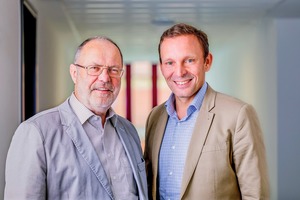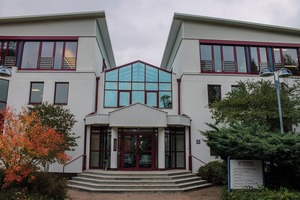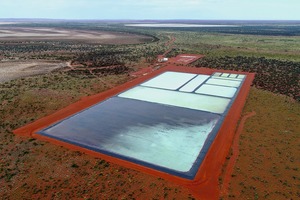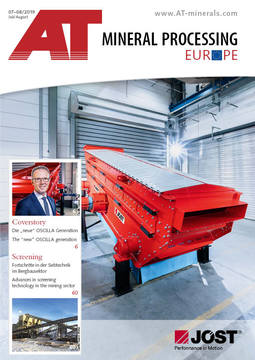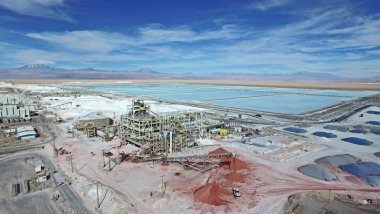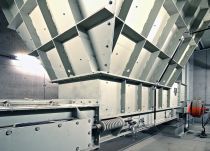Economic “unexplored territory” in the Outback – Made in Germany
After more than four years of preparatory and canvassing work, numerous negotiations, exploratory campaigns and test presentations, the contracts for this multi-million project (more than 170 million Australian Dollars [AUD]), including financing (KfW IPEX) and export guarantees (Euler-Hermes) from Germany, are now home and dry. A consortium (EBTEC) consisting of Sondershausen‘s K-UTEC AG Salt Technologies and the processing-equipment, plant and process-engineering specialists EBNER, from eastern Hesse‘s Eiterfeld, on the boundary to the County of Wartburg, is to make the complete project reality – from the basic idea and development of processes, up to and including construction and operation of the plant, as well as training of the plant workforce. The order volume for the consortium: 28 million €.
All this is easily said, but the site on which the plant is to be constructed and operated at present still has no connection to the road system, and is 160 km, as the crow flies, from the nearest town, the small mining colony of Newman, which has just on 5500 inhabitants. There is, however, a small airfield, as many “commuters” in this region travel between their homes and their places of work by means, in particular, of helicopter or aircraft.
K-UTEC director Dr. Markus Pfänder, who conducted many months of negotiation and explored and coordinated many details for the project on site notes: “These are predominantly underground salt deposits located 160 km to the south-east of Newman. Travelling there in a Jeep takes a whole day, and for this reason, we flew to our target in a helicopter in just two hours. At present, there are neither real roads nor any pipes or cables for supplies.”
A group of companies (DRA) from South Africa and active worldwide, with a branch in Perth/Australia, is now to take care of this. DRA Global has an EPCM contract for this purpose, and will be responsible for project implementation in the wider sense, for civil works, underground engineering and other infrastructural provisions, such as transport links and the supply facilities for electricity and water, to make it possible to implement the main project, the construction of the fertiliser plant. The Hessian-Thuringian consortium, EBTEC (EBNER and K-UTEC) will be responsible for the “central element” of Kalium Lakes Ltd.‘s “Beyondie Sulphate of Potash (SOP) Project”, however: supply of the key components, the facilities for evaporative thickening of the solutions from the salt solutions recovered underground or on the surface, the systems for cooling crystallisation, centrifuge engineering, drying, dedusting, flotation and packing.
What for the Australian client still remains unexplored technological territory, soon to be the “cradle” of its own fertiliser production line, is based, for the scientists and engineers from K-UTEC AG Salt Technologies, Sondershausen, a spin-off successor to the GDR‘s former Potassium Research, on many years of Potassium Research projects and successes, as in the case of Saline Austria and other projects around the world.
For K-UTEC, the Beyondie project is nonetheless much more than “just” a milestone in the company‘s history. Above all, the experts from northern Thuringia have been the researchers, idea finders and process developers in their projects, drafting solution proposals for particular problems and then helping others to make them reality in a project.
This was too little for the clients from the world‘s fifth continent, however. The Australians want “everything from a single source”, complete with full responsibility and process guarantees from the idea up to the completed, ready-to-run plant. Even in labour terms alone, the private joint stock corporation in Sondershausen, with its just on 100-strong staff, could not have taken on the project. The processing-equipment capabilities of an experienced plant engineer were therefore necessary to complement K-UTEC‘s technological competence: EBNER, in Eiterfeld. The two companies know each other from previous successful and mutually confident cooperation and were now able to convince Kalium Lakes and the participating banks and funding institution that the EBTEC consortium (K-UTEC and EBNER) formed for the tasks in Australia‘s “outback”would be capable of completing the “Beyondie SOP Project”.
K-UTEC AG Salt Technologies in Sondershausen performed for the Australia project several years of intense preliminary work extending through all the company‘s departments: exploration and characterisation of the deposits, the reserves, the resources, followed by a Feasibility Study and the Basic Engineering. The overall assessment of the project ultimately proved positive, both for the KfW bank and for Australia‘s NAIF development bank. The KfW had an audit performed of both K-UTEC and of the planned process by the British company, SRK Consulting. In addition, Kali+Salz (K+S) also conducted its own process evaluation, concluding with extremely positive findings for K-UTEC. As a result, K+S has now made with Kalium Lakes an “offtake agreement” and a ten-year contract for purchase of the entire potassium sulphate production.
For Dr. Heiner Marx, CEO of K-UTEC, the Australia project with the EBTEC consortium is a further step in his company‘s evolution: “This project marks the start of a new chapter in our corporate strategy. Above and beyond the idea, the process development and the process-engineering, we are now taking on new tasks and guarantees for the key components of the facilities and for their operation. To use a sporting analogy, this step is, for K-UTEC, like promotion into the Champions League. In this business, mediocrity is not on the agenda. Mediocrity would, in fact, mean regression!”
Autor/Author: Dieter Lücke

